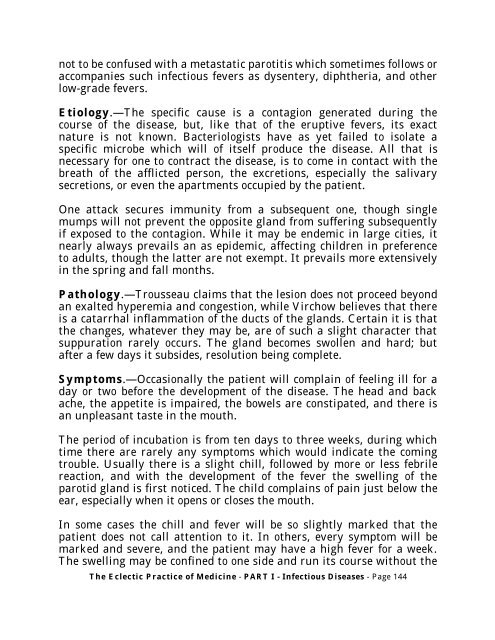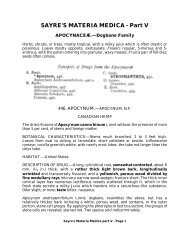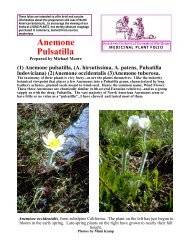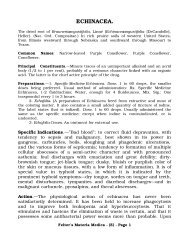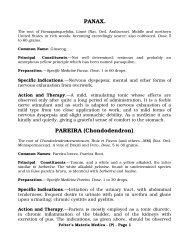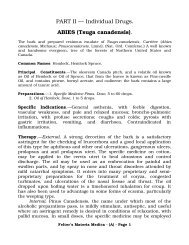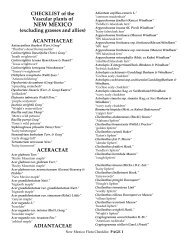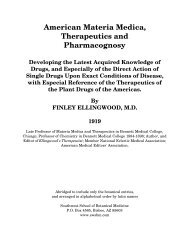SCARLET FEVER. Synonyms.—Scarlatina; Scarlet Rash. Definition ...
SCARLET FEVER. Synonyms.—Scarlatina; Scarlet Rash. Definition ...
SCARLET FEVER. Synonyms.—Scarlatina; Scarlet Rash. Definition ...
Create successful ePaper yourself
Turn your PDF publications into a flip-book with our unique Google optimized e-Paper software.
not to be confused with a metastatic parotitis which sometimes follows or<br />
accompanies such infectious fevers as dysentery, diphtheria, and other<br />
low-grade fevers.<br />
Etiology.—The specific cause is a contagion generated during the<br />
course of the disease, but, like that of the eruptive fevers, its exact<br />
nature is not known. Bacteriologists have as yet failed to isolate a<br />
specific microbe which will of itself produce the disease. All that is<br />
necessary for one to contract the disease, is to come in contact with the<br />
breath of the afflicted person, the excretions, especially the salivary<br />
secretions, or even the apartments occupied by the patient.<br />
One attack secures immunity from a subsequent one, though single<br />
mumps will not prevent the opposite gland from suffering subsequently<br />
if exposed to the contagion. While it may be endemic in large cities, it<br />
nearly always prevails an as epidemic, affecting children in preference<br />
to adults, though the latter are not exempt. It prevails more extensively<br />
in the spring and fall months.<br />
Pathology.—Trousseau claims that the lesion does not proceed beyond<br />
an exalted hyperemia and congestion, while Virchow believes that there<br />
is a catarrhal inflammation of the ducts of the glands. Certain it is that<br />
the changes, whatever they may be, are of such a slight character that<br />
suppuration rarely occurs. The gland becomes swollen and hard; but<br />
after a few days it subsides, resolution being complete.<br />
Symptoms.—Occasionally the patient will complain of feeling ill for a<br />
day or two before the development of the disease. The head and back<br />
ache, the appetite is impaired, the bowels are constipated, and there is<br />
an unpleasant taste in the mouth.<br />
The period of incubation is from ten days to three weeks, during which<br />
time there are rarely any symptoms which would indicate the coming<br />
trouble. Usually there is a slight chill, followed by more or less febrile<br />
reaction, and with the development of the fever the swelling of the<br />
parotid gland is first noticed. The child complains of pain just below the<br />
ear, especially when it opens or closes the mouth.<br />
In some cases the chill and fever will be so slightly marked that the<br />
patient does not call attention to it. In others, every symptom will be<br />
marked and severe, and the patient may have a high fever for a week.<br />
The swelling may be confined to one side and run its course without the<br />
The Eclectic Practice of Medicine - PART I - Infectious Diseases - Page 144


